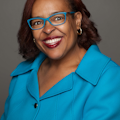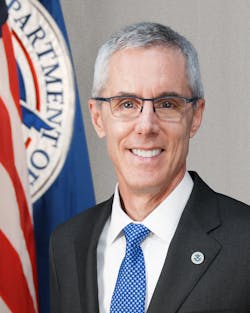Neffenger Says TSA and Airports Need to Work Together on Security Lines
The message from Peter Neffenger, administrator of the Transportation Security Administration (TSA) was clear: his agency and airports need to work together to come up with solutions that allow for safe and secure operations, and doing it efficiently and effectively.
Neffenger stated that he heard the industry's concerns in a keynote speech at the annual American Association of Airport Executives (AAAE) annual meeting May 17, in Houston. He threw out his prepared remarks, saying he wanted to address airports' concerns instead.
Neffenger acknowledged the situation at Chicago O'Hare International Airport (ORD) on May 16 where nearly 500 passengers were stranded because of long security lines.
"I don't know the cause, but I have my team out there investigating to see what happened," he stated.
TSA's fundamental mission is to secure the aviation system, and it's been a challenge to that job well and not slow down the system, Neffenger said.
"For the past six months, we've been working with airports and airlines to change the way we talk together," he said. "The theme of this conference is the power to connect. It's more than a theme. It's also a way to address real concerns about security. We're in a tough threat environment, but it's tough to manage systems that are so large."
TSA officers found a record number of weapons coming through security checkpoints last year, Neffenger said.
"Most say I forgot I had that gun, but who know," he said. "We have to be diligent about processing passengers through checkpoints in an efficient way."
Neffenger noted that when he started at TSA last summer, the agency was smaller than it was four years ago. "We lost staff and were scheduled to lose another 1,600 people in FY 2016, but we asked the president and Congress to stop that," he said. "We've already started hiring people back who had left."
TSA also opened its training academy, said Neffenger. "Before, we trained all over the country and it was not done in a consistent way. The academy is the first step in creating an efficient and trained frontline workforce."
The agency is training 200 officers a week, but it's not enough, Neffenger said.
"We've authorized waivers to allow local training so we can be ready for summer, because we're going to see higher passenger volumes," he stated. "The goal is to get many people through lanes as quickly and safely as possible in time for summer. We'll also get more overtime to push to airports so we can staff more effectively during peak times."
Neffenger appealed to airports to work with TSA's federal security directors on ways to be creative when staffing checkpoints. "I've seen creativity to get through this challenging time. I'm also looking to gather best practices wherever they're happening," he said. "We don't want to be a impediment and we can't do it alone. We are part of the system and looking at true partnerships."
At some point, the system need to be transformed, Neffenger said.
"We all have the same goal in mind — a system that is safe and secure," he said. "But we need to think of ways to do things differently. In the screening environment, we're using a model that's decades old. Are we doing it in the most effective and efficient as possible?"
One simple way is automated security systems, which are already being used outside the U.S., Neffenger said. "London Heathrow and Amsterdam Schiphol have automated security checkpoint lines, and I want to introduce that here at our busiest and most congested airports."
The current system of pushing bags down a table slows things down, Neffenger said. "All of that can be overcome with automation. We're doing two demonstration lanes at Hartsfield-Jackson International Airport by end of the month," he said. "I'm a big fan of evolving the system."
TSA has a group, the Innovation Task Force, that's meant to look at the possibilities right now to do things differently, Neffenger said.
"We have representatives from airports and the airlines," he said. "I see real promise with the group as they think about important ways to think about the future."
About the Author

